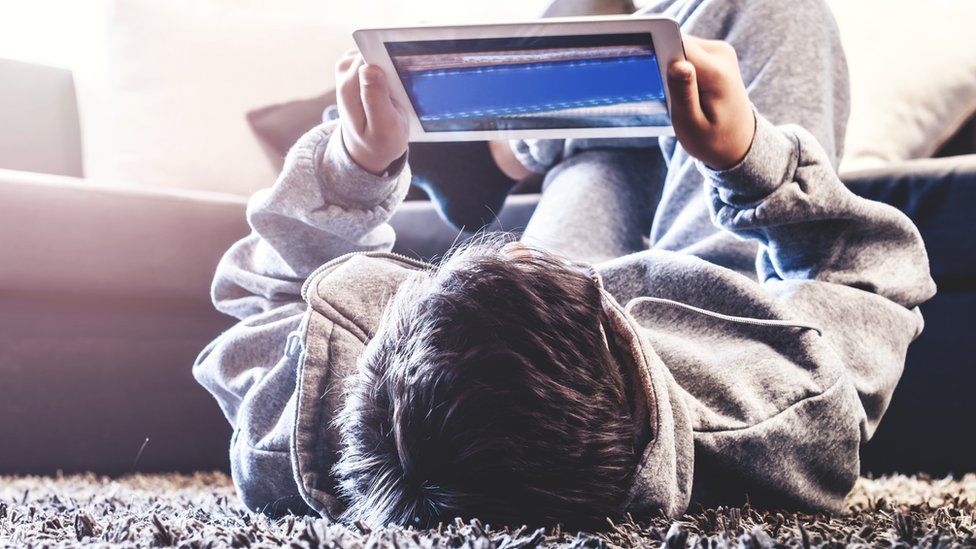Moderate screen use 'boosts teen wellbeing'
- Published

A study of screen time and mental wellbeing among teenagers has suggested moderate use of devices may be beneficial in a connected world.
The researchers collected self-reported data from 120,000 English 15-year-olds about their digital device habits.
They found a "Goldilocks effect" where a few hours of device-use seemed to boost mental wellbeing.
One developmental psychologist welcomed the paper but said there was still room for more study.
"Moderate engagement in digital activities is not harmful," notes the paper, published today in the journal Psychological Science.
In addition, the first hour or two of screen time was actually associated with an increase in mental wellbeing for those using computers, smartphones, video games and watching TV or films.
'Goldilocks effect'
Weekday use with a positive effect on wellbeing was described as follows:
- Playing video games: One hour 40 minutes
- Using a smartphone: One hour 57 minutes
- Watching TV and films: Three hours 41 minutes
- Using computers: Four hours 17 minutes
The effect was boosted at weekends, with the peak lasting up to four hours and 50 minutes when watching TV.
However, after this point a negative effect was reported.
The authors describe this as a "Goldilocks effect" - referring to the version of the fairy story in which Goldilocks discovers, for instance, that the best porridge is neither too hot nor too cold.
Young people's screen time has increased with the rise of digital devices used at home.
For example, children - including pre-schoolers aged three and four - are spending eight hours and 18 minutes a week online on average, according to a recent report by Ofcom.
Their research stemmed from a larger survey about the habits of nearly 300,000 English 15-year-olds, explained co-author Andrew Przybylski at the University of Oxford.
"We found that the negative effect of screen time was about a third of the size as not getting regular sleep or a regular breakfast," he told the BBC.
But Dr Przybylski acknowledged that most children don't simply use one device during the day - and in fact often use more than one concurrently, such as when texting a friend while watching TV.
'Choose your battles'
He suggested that rather than totting up screen time and demanding that children stop using a device after a certain point, it might be more beneficial to negotiate longer sessions and suggest alternative activities when appropriate.
"It's not so much that it's bad for a kid to play Minecraft for 12 hours on a Sunday, it's that as parents we often don't have a valued activity that we put in place of that," he said.
"It's much more important that the parents focus their limited attention and resources on picking smart battles - that might be more important than having an arbitrary cut-off."
The paper's results on the "Goldilocks effect" were welcomed by Sue Fletcher-Watson, a developmental psychologist at the University of Edinburgh.
"I think that is quite new - at least, previously, it's only been a hypothesis.
"It's really nice to have concrete evidence on that idea," she told the BBC.
However, she said there were still questions about how using digital devices affects children over time.
"One of the categories they look at is using smartphones - but that covers a huge variety of activities," she said.
If an activity exposes a child to trolling or cyberbullying, then it would naturally be likely to have a more negative effect on mental wellbeing, she suggested.
Letter wars
On Christmas Day last year, an open letter was published in the Guardian by a group of educators and psychologists that called for better guidelines, since screen-based lifestyles might harm children's health.
This was followed in January by a another open letter - co-signed by Dr Przybylski and others - that argued more evidence was needed before the full effects of children's use of screens was understood.
"I do feel there needs to be much clearer guidance available," said Prof Jayne Osgood at Middlesex University, a signatory of the first letter.
"Parents and educators feel ill-prepared to know what is an appropriate amount of exposure to screen time for children."
In 2013, a Public Health England briefing paper warned that too much time in front of screens combined with a sedentary lifestyle was harming children's wellbeing and increasing their anxiety.
"A few simple steps, like regular physical activity and spending time together as a family at breakfast and dinner, can minimise young people's screen time and support their wellbeing," said Eustace de Sousa at Public Health England, reacting to today's research.
- Published24 October 2016
- Published6 January 2016
- Published6 January 2016